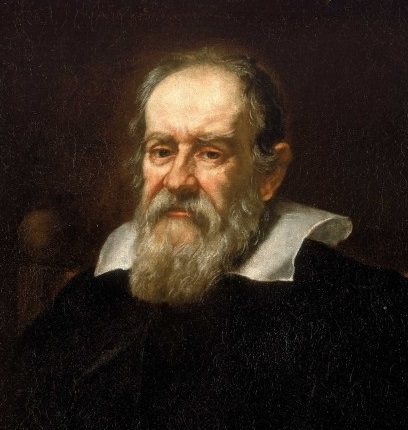
Professor of mathematics at Pisa, Galileo was one of the first persons to point a telescope at the heavens, and to discover things no one knew about it before. Galileo is today, however, more famous for his clash with the Roman Catholic Church over whether the Earth moved around the Sun or vice versa, for which he was condemned as a heretic and confined to house-arrest for the rest of his life; an event that continues to be cited by simple folks as an example of the conflict between science and faith.

Born into a musically-gifted family, Galileo was educated, first in a monastery, and then studied medicine at the University of Pisa, where he was also introduced to the joy of physics and mathematics. He was, however, unable to finish his studies due to financial reasons; this did not stop him form being appointed professor of mathematics at the university. Increasingly also he began to find plenty to disagree with the (earth-centered) Aristotelian world-view to which the Roman Catholic Church had wedded itself.
In 1609 Galileo heard news of the invention of the telescope. Without having seen one, he quickly worked out its optics and made his own, and over the years increased it magnifying power. With it he began to explore the heavens, becoming the first person to map out the moon. The following year he discovered the four moons of Jupiter, and observed that Venus went through phases just as our moon does. As he did so, Galileo also became more and more convinced of Copernicus's helio-centric view of the universe (though Copernicus' definitive work was not published until 1543, just before he died, handwritten copies of his views had began to circulate among his friends by about 1514).
Galileo's view clashed directly with the Church's Aristolelian opinion. Galileo could have saved himself a great deal of trouble with the Church had he done what Copernicus did, writing quietly and waiting for the right time to come. But Galileo was not such a person and his personality made conflicts easy. So it came that he was soon told, first in private audiences with church officials, to demure on the subject, until 1614 when he was summoned to .

TIME-LINE:
1564 — Galileo is born near Pisa on 15 Feb.
1592 — Galileo is appointed professor of mathematics at Pisa University.
1609 — Galileo hears about the invention of the telescope and constructs his own.
1610 — Galileo publishes Sidereal Messenger — Galileo becomes official mathematician to the Grand Duke of Tuscany, Cosimo I de Medici.
1614 — Galileo is accused for the first time of heresy for supporting Copernicus's theory.
1616 — Catholic Church condemns Copernicus's teaching and Galileo is forbidden to teach or advocate the theory by the Catholic Church.
1618 — Start of the Thirty Years' War.
1632 — Galileo publishes his Dialogue Concerning the Two Chief World Systems, and was again charged with heresy.
1633 — Galileo goes on trail and is placed under permanent house-arrest.
1638 — Galileo's Discourses on Two New Sciences is published.
1642 — Galileo dies, 8 Jan.

BIBLIOGRAPHY:
James Hannam, The Genesis of Science. How the Christian Middle Ages Launched the Scientific Revolution. Washington: Regnery Publishing, 2011. See esp. pp. 303-343.
Ronald L. Numbers, ed., Galileo Goes to Jail and Other Myths about Science and Religion. Cambridge, MS/London: Harvard University Press, 2009.

©ALBERITH
030619lch